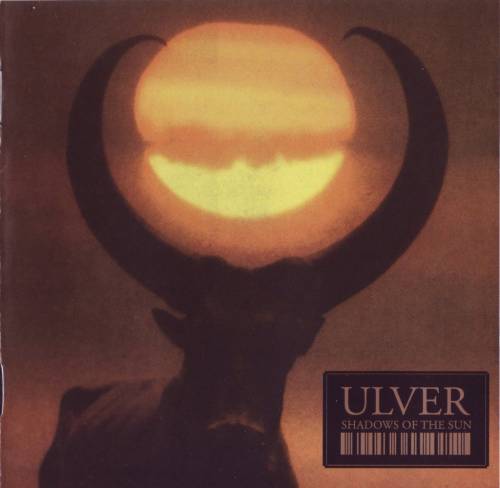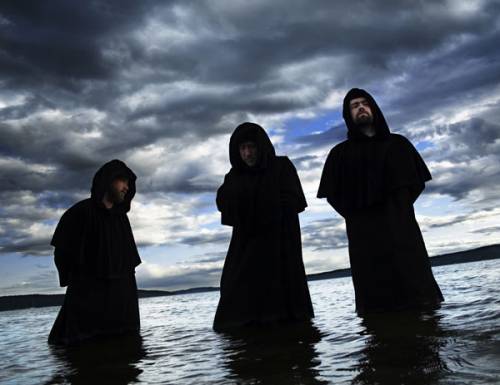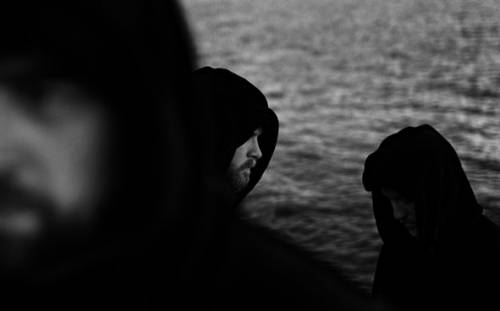19:58 Ulver - Shadows Of The Sun /2007 |
 Год : 2007 Tracklist : Playing Time :39:58 Размер : 93 mb Trickster G. (Kristoffer Rygg aka Garm) - Vocals
Quote Закономерное движение Ulver-а к растворению в пост-роковости (имеется в виду особый мировоззренческий феномен) и окроплению измученных извилин собственного композиторского гения святой водой классики. Принимая во внимание туманистую, освежающую природу музыки, можно сказать, что все песни, одна за другой, буквально поглощают собой слушателя, стирая очертания окружающего его мира. Лично я не могу избавиться от видения того, как эта чарующая музыка то низко стелется по пустынным улицам, то вдруг что-то тянет ее вверх… Дух города по-прежнему владеет умом Кристофера Ригга сотоварищи, что особенно художественно передается посредством обезоруживающего своей одинокостью саксофона ("Let the Children Go”) и, естественно, всем тусклым колоритом безжизненных каменных пейзажей. Ритмические акценты редки и тем эффектнее они воспринимаются как выходящие из долгой спячки, обусловленной давлением эмбиента. Щадящий дрон позволяет почувствовать, что мы вновь пережили апокалипсис и… остается только гулять и искать признаки жизни и того, что бы вызывало у нас слезу – тогда уже клавишная игра наносит верные штрихи гуманизма. Очень хорошей визуальной аналогией к музыке Ulver с этого альбома будет, как мне кажется, знаменитое видео к "Untitled 1 (Vaka)” небезызвестных Sigur Ros. Песня Black Sabbath "Solitude”, которую Ulver выбрали для кавер-версии, и без того подходящая по настрою для этого альбома, заиграла истинно ульверовскими красками и полностью вросла в художественную ткань «Shadows of the Sun». Без преувеличения, после прослушивания этой композиции, кажется, что норвежские музыканты имеют на нее не меньше прав, чем Айомми-Батлер-Осборн-Уорд. От ультраклассики до ультрасовременности. Пост-музыка в своем наилучшем проявлении… +другие рецензии
Quote It's hard to say that a group like Ulver could "return to form" in any significant sense, since while they may have dwelled at particular points of experimentation for more than one album, they've certainly never looked back. And Shadows of the Sun doesn't sound exactly like any previous Ulver albums, though it seems to be a digestion of all of the lessons learned in electro-acoustic music between Metamorphosis and A Quick Fix of Melancholy. Where Perdition City was expansive in its textural possibilities, Shadows of the Sun is intimate, (sometimes to the point of being claustrophobic), a living room-close chamber blend of electronics and acoustic instruments. And if you're a hardcore Ulver fan, you'll recognize the chord progression of Eos as that of the melancholy piano theme to Uno, one of Ulver's unreleased film score projects and my least favorite of all of the group's work. Ulver has creatively recycled before, turning Nattleite from Kveldssanger into brooding and tense electronica called Eitttlane. Eos is less of a radical transformation and more of a development, but certainly adds a lot of emotional weight to what was once a static miniature. And I'm not hugely familiar with the Sabbath original, but Solitude is structured around a guitar and bass melodic fragment, with Matthais Eick's occasional jazz trumpet obbligato and tons of electronic treatments keeping the texture unstable throughout the song. The texture is where this album gets most of its interest, since it is on the repetitive side in terms of pure melody and harmony. Whether through electronic processing, (by Fennesz on the hallucinatory Vigil), or by some wonderful additions to Ulver's standard instrumental lineup, this album keeps itself fresh in terms of all the composition and arranging, without the textural overload that some complained about with Blood Inside. The aformentioned Eos expands its tentative initial chord progression by placing Pamelia Thurstin's wonderfully rich theremin sound with the Oslo Session string quartet; Garm's vocals are also processed through a vocorder for the second half of the song. The theremin returns in a deeper register in Funebre, a pure tenor wail with such controlled vibrato on such a melancholy, eastern-European sounding melody. All The Love employs some more modern compositional techniques, dropping in a keyboard loop that grows quieter as it speeds up, splitting the listener's attention away from the solemn 4/4 groove, one of the few uses of drums in any form on this album. Ulver goes atonal at the end of Like Music, utilizing the electric guitar effects manipulation of Espen Jorgensen in combination with their own washes of generated sound, and into more tense melodic territory for What Happened?, though that bit of sonic tension is set upright when the strings and synth play the album out on a variation of the opening chord progression. This album is quite texturally interesting, but certainly not perfect. Garm's vocals stay in the lower octaves, and while there is distinct emotional impact when we do hear him in something close to the traditional falsettos, his vocal range is a distinct part of Ulver's appeal. Finally, it seems that Ulver gets a little nervous flying solo with little or no textural assistance from their collaborators; while the title track and Let the Children Go are crammed full of great musical ideas, they seem to be self-conscious of overusing each element of the piece and shift somewhat jarringly between them. (I enjoy both of these tracks, especially the section of Let the Children Go stripped down just to trumpet, bass, synth chords and drums.) I was a fan of the direction Blood Inside suggested — it was crowded and somewhat paranoid, but it was a genius throw of the net for Ulver. Shadows of the Sun turns inward from that ocean of musical collage and seems to be decidedly more European. But I'm glad to have an album to play on loop during rainy days, as I felt both Perdition City and the Silence EPs were. Shadows is an Ulver album to negotiate with, not to butt heads with. The negotation is passive, but thoroughly interesting. ~~~~~~~~~~~~~~~~~~~~~~~~~~~~~~~~~~~ |
|
|
| Всего комментариев: 0 | |





